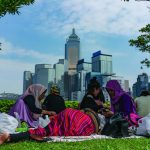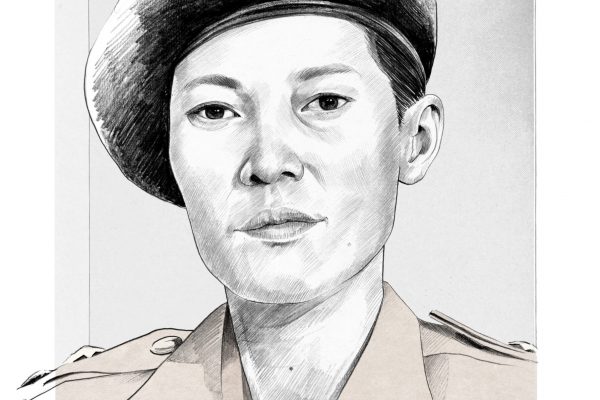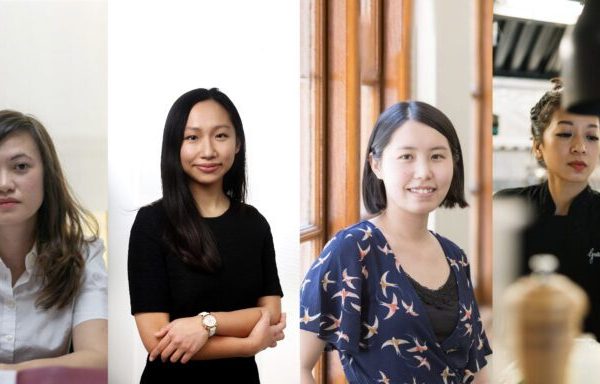Chance Encounters: Bright hearts in the dark era of Covid-19
As we navigate the Covid-19 pandemic and all the uncertainty it brings, many of us may long more deeply for authentic human connections. Though we may feel alone due to social distancing restrictions and disconnected from others, there are many opportunities to find meaningful interactions across the city. From mountain trails, tiny shops or quiet park benches, moments of connection and solidarity surface when you least expect them.
On a Hiking Trail
Meandering along a hiking trail on Lamma island, I came across a woman named Fa, who looked to be in her 50s. Fa, which means flower in Cantonese, collects rubbish and sweeps the trails of the island every day, rain or shine. As she took a break under the midday sun, I asked about her work.
To my surprise, she immediately opened up on matters of the heart – her love for the island community, thoughts on relationships, conflicts she’s overcome, and her connection with children. Here is Fa’s story in her own words:
“This has been my job for more than 10 years. I sweep the streets, clear the walking trails and collect rubbish on the island of Lamma. There is such a wonderful community here; people are friendly, kind and we look after each other.
“I am originally from Shanwei, but have lived in Hong Kong for several decades now. I grew up in a family of farmers. My whole family, including me and my seven siblings, lived together in a tiny house on the farm. Even though we didn’t have much and life was very simple, we were very happy. Being on Lamma gives me that feeling of being home.”
“Lamma is generally a clean island, although we have a lot of extra work to do after a typhoon or big storm. I don’t find the job itself to be too tough or tiring, and I love living and working on Lamma.
“Although during the summer it can get unbearably hot. Sometimes I go into the public library to take a little breather – they have air-conditioning there. However, I am illiterate so I don’t know how to read.
“Before taking on this job, I used to work as a cleaner in a kindergarten. I don’t speak English, so I couldn’t communicate verbally with the little kids there. However, despite the language barrier, I think we still had a wonderful connection – they seemed to like me a lot.
“A few decades ago,I moved to Hong Kong to join my husband. I was introduced to him by family friends, and had a great impression of him the first time we met. To me, he is a handsome and kindhearted man. I am very happily married.
“Do we fight? Of course! It would be strange for couples to not bicker and argue sometimes, but then you just forgive and forget. I would say I am a positive person. I think the most important thing in life is to be happy – don’t you think?”
In a Shop
While exploring School Street in Tai Hang, I came across a tiny stall overflowing with yellowing posters and what looked like scraps of leather. Curious, I peered into the shop and found myself standing squarely in front of an old man, who appeared to be in his 70s.
The man, who goes by Kwun, has been sewing taxi seat covers for 50 years. I’d never heard of a taxi seat upholsterer before, so I asked him about his trade. Kwun dusted off an old biscuit tin of memorabilia, dug out old photo and, in a grandfatherly manner, shared his story with me:
“I have worked as a taxi seat upholsterer for over 50 years. I’m originally from Zhongshan, but moved to Hong Kong with my parents when I was 17 years old. I didn’t know what I wanted to do back then, so I just decided to learn a trade.”
“I buy the fabrics [at the wholesale markets] in Sham Shui Po, and then I make each taxi seat cover from scratch – it takes me about two hours per piece. Taxi drivers will come to me whenever they have ripped or damaged seats. I usually have stock ready so it only takes 10 minutes for me to replace the whole thing with a new leather cover.
“The name of my shop is Wong Zai (meaning ‘Little Wong’), but now it really should be Wong Bak (‘Grandpa Wong’). I think I’m pretty much the only person still doing this on Hong Kong island. There are a few others in Kowloon. It’s a dying trade; we are becoming extinct. Sometimes I take taxis and recognise my own work in their seats. If I’m the only guy doing it around here it’s not too difficult.
“Every morning I start my day at the same dim sum [restaurant]. I’ll have Chinese tea, some har gau and siu mai before work. I don’t take any holidays. When there is work to do, I will do it.
“I’m here seven days a week, except for when I am ill. I have never travelled abroad or taken an airplane. During my down time, I usually take naps or listen to the radio. I heard on the radio today that there will be heavy rain, so I wore my rainboots. I’m always prepared and I have everything, except for money.”
On a Park Bench
On a Tuesday evening, I found myself sitting on a park bench, overwhelmed with stress and uncertainty after a challenging week. Out of the corner of my eye, I saw a young gentleman roll out a prayer mat; he knelt and started to pray. His movements calmed me, as I turned my gaze to the treetops and the night sky.
Suddenly, a stranger joined me on the bench. “Hi, I’m Ali. Where are you from?” Ali’s warmth lifted my mood at a time when I needed it most. He told me:
“I drive my motorbike around and make between 8-12 deliveries on average each night. I like this [line of] work but it can be stressful at times, because every minute counts.”
“I used to get lost a lot when I first started, or customers would sometimes give the wrong address. And then there is the constant challenge of finding a parking spot, of course. If we get a ticket then that’s a setback of over HK$300, which is quite a hit!
“Rain or shine, I deliver, even when there is a red alert rainstorm. I try to be cautious as I’ve been in two accidents before while making deliveries; one time I was hit by a car and the other time I slid onto the tram tracks.
“It’s also hard to not be concerned during Covid-19 as we deliver to so many households; but I still have to work, so I just try to limit physical contact. Most customers are friendly, but we have definitely come across some rude ones who just stick a finger out to collect the food, without even acknowledging us or showing their face. It’s not always just about the tip – a simple ‘hello’ or ‘thank you’ could go a long way!”
“Delivering food is my part-time job; I am also studying English and working as a teaching assistant at an Islamic college. I am 30 years old and my dream is to become an English teacher. As a kid, I was inspired by my own teacher to never stop studying and learning. I would love to eventually teach English, especially to ethnic minorities in Hong Kong.”
“This city is full of temptations and it’s so easy to spend [money] – I like to keep busy so I spend less! I moved to Hong Kong with my family from Attock, Pakistan, 20 years ago. My father has been in Hong Kong or over 60 years now – he came here to make a living as a security guard.”
“I was hesitant to tell my family that I was working as a food delivery driver at first; I was afraid that they would not approve and think that the work is not valuable but, to my surprise, when they found out they were all very supportive. My parents were happy that I was trying something outside of the box.
“I would credit all my achievements to my elder brother. When he was 17 years old, he made the decision to stop studying and work so he could give my other brother and I better opportunities. I will always be grateful for that and I want to make him proud.”
This photo essay was produced by Hong Kong Shifts, a visual storytelling project founded by Cynthia Cheng and Maxime Vanhollebeke. The project advocates social inclusion and diversity in Hong Kong, with an aim to make a positive impact on society.
Check out more of their work on their website.




